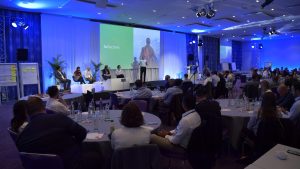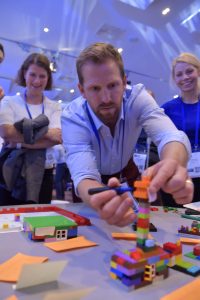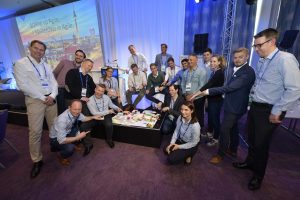
The day began with an overview of the retail scene in Berlin, provided by Dr. Marcus Jacob, Partner, McKinsey & Company. Marcus provided a history of retail in the country, noting Germany is a unique discounter territory. He also highlighted how it is the birthplace of private label in Europe and home to rich customers in a land of low prices. The German retail market is worth 185 billion euros, with EDEKA, Schwarz Group, REWE and ALDI the dominant forces. Many of these offer discount formats that comprise significant share of the market. Such is their popularity, share of retail sales for discounters grew to 42% in 2009, causing supermarkets to find new ways to attract customers.
Delegates were also provided insights into why, unlike many other territories, Germany struggles to find a place for convenience stores and online grocery sales. He said German’s have easy access to large stores, so it’s the bakeries and butchers that are expanding to now offer convenience. And, with regards to eGrocery, he said German’s are conscious about privacy, broadband coverage is unstable, credit card penetration is low, and the dispersed population is also a problem.
Once delegates knew everything they needed about retail in Germany, they boarded buses to explore stores of the city – Frischeparadies, Kaufland, METRO, Penny and REWE. Visiting a mix of retail formats, delegates were guided around stores by store managers and directors, as they were told about how the stores are working to increase operational efficiency, promote healthier diets and lifestyles and find effective ways to help reduce food waste.

Following the agile exercises, the young leaders provided feedback on their agile experiences. Delegates highlighted the importance of communicating with the client and being open to making adjustments. Flexibility was important. It also allowed to be more efficient and effective. Many of those reporting back also felt working in small teams and making regular course corrections was key to success. Such regular reviews meant mistakes didn’t become problems.

— Ends —
About The Consumer Goods Forum
The Consumer Goods Forum (“CGF”) is a global, parity-based industry network that is driven by its members to encourage the global adoption of practices and standards that serves the consumer goods industry worldwide. It brings together the CEOs and senior management of some 400 retailers, manufacturers, service providers, and other stakeholders across 70 countries, and it reflects the diversity of the industry in geography, size, product category and format. Its member companies have combined sales of EUR 3.5 trillion and directly employ nearly 10 million people, with a further 90 million related jobs estimated along the value chain. It is governed by its Board of Directors, which comprises more than 50 manufacturer and retailer CEOs. For more information, please visit: www.theconsumergoodsforum.com
For more information, please contact:
Lee Green
Director, Communications
The Consumer Goods Forum
[email protected]
